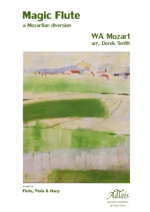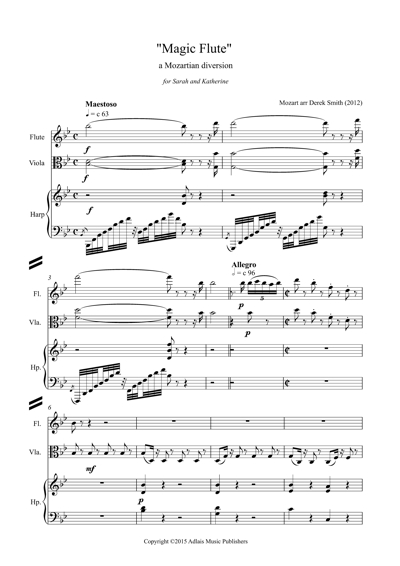 |
|||
| |
of Harp Music |
| © 2004-2025 ADLAIS |
| Magic Flute a Mozartian diversion WA Mozart (1756-1791) arr. Derek Smith |
return to previous page |
 |
Work: | Single work for Flute, Viola & Harp |
| Catalogue No: | Adlais 214 | |
| ISMN: | 979-0-57032-232-9 (set) | |
| Edition: | November 2015 Score & three instrumental parts (A4 Stapled) | |
| Duration: | c. 10' 43" minutes | |
| Suitable for: | Intermediate Trio | |
| Price:: | £16.00 Go to shop | |
| See all Adlais Publications by Derek Smith | ||
MOZART arr. DEREK SMITH: Magic Flute: A Mozartian Diversion
Following an economic and cultural recession, opera may seem a luxury. “Magic Flute” reduces Mozart’s profligate cast of sixteen principal singers, chorus, large orchestra with special instruments, children, animals which include a terrifying snake, with simulated fire and water effects, to the more tractable ‘flute, viola and harp’, taking but 12 continuous minutes rather than well over two hours, making it more suited to the attention span of children and contemporary listeners.
Bringing Mozart up to date has eliminated certain regrettable elements of political incorrectness which infect his original. There is now but a brief genuflection to pillars and temples which could so easily offend those of other faiths. For the same reason, the High Priest Sarastro, a misogynist of dubious morality, has been airbrushed out together with the “three boys”, doubtless products of his abusive cult. Likewise eliminated are the “Trials”, which carry with them some risk of personal failure. Papageno, after his heartfelt call for support and understanding by the community, does not seriously attempt to hang himself but, instead, is rewarded by immediate access to Papagena, the love of his dreams, being the instant gratification all now deserve. Briefly acknowledging the contribution of that least successful of immigrants, the unfairly maligned Monostatos the Moor, the apotheosis of this Trio celebrates the Queen of the Night who, despite an evil reputation propagated by her ageist detractors, triumphs over the illusory “good” which permeates Schikaneder’s libretto without thought for the fate of her companions, the “three ladies”, so reflecting society’s lack of outreach, albeit in an earlier and less responsible age.
Derek Smith
About the Arranger
Derek Smith won composition prizes at University College School. He was an early member of the National Youth Orchestra of Great Britain (NYO) where he met tutor Malcolm Arnold with whom he subsequently studied composition. Norman Del Mar taught him conducting, other influences being Colin Davis and Lennox Berkeley with whom he occasionally played chamber music. Music, both as performer and arranger, was pursued in the background during a scientific career, emerging as a full-time activity following an early retirement.
Derek won the BBC/Henschel Quartet composition prize in 2008-9 with Carolingua later performed at Kings Place and recorded by NEOS. His music is widely featured in West Midlands and Border programmes, seven concerts containing his works being given during the year 2014. Five CDs have been recorded. ADLAIS is his publisher of sheet music for harp ensemble. Other close associations are with Ariel Music Publications, the Royal Welsh College of Music & Drama in Cardiff, Espressivo Concert Promotions and the Coull String Quartet.
Derek’s copyright has been assigned to GEMMA CLASSICAL MUSIC TRUST, of which he was a founder Trustee, now retired. All income from music sales and related activities is remitted directly to the Trust www.gemmatrust.com.

Front cover image: Looking back at Jicin by Catherine Baker
60 x 76cm Acrylic on canvas (2013)
Adlais Music Publishers are very grateful to Catherine Baker for her kind permission to use this image of her painting “Looking back at Jicin” on the front cover of this score.
“This painting was produced as part of a 2-week residency in Jicin, a beautiful little town north of Prague, in the Bohemia region of the Czech Republic. The brief was to produce work to celebrate the town and the surrounding area. I came across this view with the lush green fields in front, which I thought would be a perfect place to sketch and base one of my paintings on. Barely discernible in the foreground are some Roman numerals, from the inlaid house numbers on doorsteps in one of Jicin's streets, left as a memorial to a once-thriving Jewish community.”
Catherine Baker
www.cathbakerpaintings.co.uk
